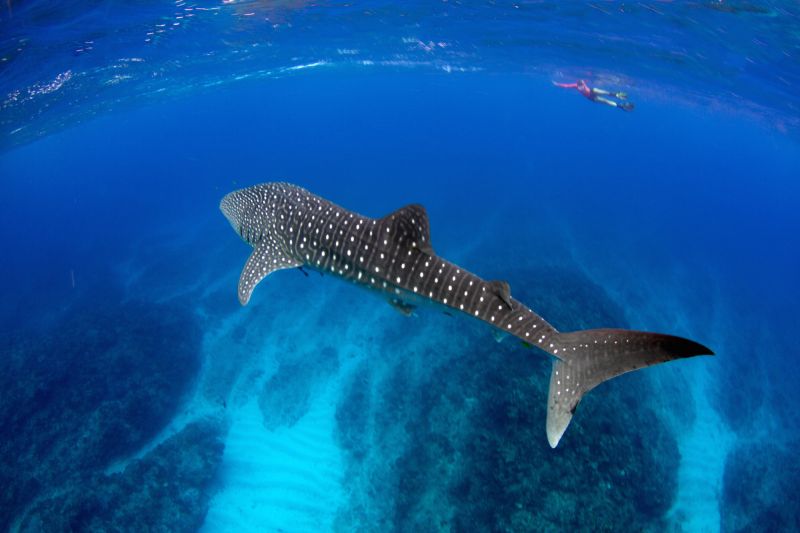Growing to lengths of up to 12 metres, the Whale Shark is the world’s largest fish! Their mouths can grow to widths of 1.5 metres too! Harmless to humans, these gigantic fish eat plankton and small fish by drawing water through their gills.
In Autumn each year at the Ningaloo Marine Park, the incredible mass spawning of coral takes between seven and 10 days after the full moon in March and April. This event triggers the arrival of krill and plankton, which in turn creates a feeding frenzy for numerous fish species, including the Whale Shark. They are sometimes observed hanging vertically with their mouths open on the water's surface, allowing water and food to pour in!

Image courtesy of Exmouth Dive & Whalesharks Ningaloo
Despite gathering in schools of up to 100 individuals, Whale Sharks are generally solitary animals. They are usually found in the tropical waters around Australia, however as the water temperatures increase in the summer, they venture further toward Austalia's south-eastern and western coastlines.
One would expect such a large 'shark' to be fast and agile in the water, however, these gentle giants are slow and leisurely swimmers who cruise at speeds of no more than 5 km per hour (or 3.1 miles per hour)!
Where can I see the Whale Shark with an expert guide?
Exmouth Dive & Whalesharks Ningaloo - Deluxe Whale Shark Swim (Full Day)
The opportunity to swim with the Whale Shark is one of the world’s greatest interactive marine encounters. This fish, the largest of the shark family and the largest fish in the world at an average of 12 meters (40 foot) in length, is a harmless plankton eater, with their graceful and passive nature providing an unforgettable day out on the waters of the World Heritage-listed Ningaloo Marine Park.
The 2019 season is operating from March 05 until August 31.
The team at Exmouth Dive and Whalesharks Ningaloo really are the region’s experts at getting you up close to these fascinating creatures. Take a look at their Whale Shark swim experience:
FAQs
Q: Is it true that Whale Sharks have teeth but don't use them to eat?
A: Yes - they have around 3000 tiny teeth, each no larger than 6mm in length. As they are filter feeders, they do not use these to eat.
Q: How much do they weigh?
A: Whale Sharks weight up to 12 tons - that is nearly 11,000 kilograms or 24,000 pounds!
Q: How many years do Whale Sharks live for?
A: The average estimated lifespan of a Whale Shark is 70 years in the wild.


